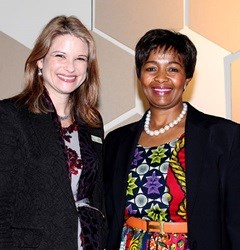
Says CEO of The Hope Factory, Annie McWalter: "The Hope Factory is a social entrepreneurial venture making a difference through growing entrepreneurs through its range of mentorship-focused programmes. Our mentorship is centered around the person - helping them achieve their goals, vision and purpose to grow themselves, their business, and ultimately to give back to their community. Not only are we helping to create successful entrepreneurial role models in communities, but we also encourage the participants of all our programmes to 'pay it forward' and find ways to give back."
The guest speaker was Wendy Luhabe, an accomplished social entrepreneur and well known South African businesswoman. Luhabe has in fact pioneered many economic empowerment initiatives for women. She believes that women have an important role in contributing to building the economy. That's why she enjoys mentoring women entrepreneurs.
Luhabe was joined by the former Auditor-General and the newly appointed CEO of the South African Institute of Chartered Accountants (SAICA) Terence Nombembe. Both firmly believe that social entrepreneurship, where the benefit to society is the main goal, can have a powerful impact on the socio-economic dynamics in our communities. "In order to address our country's social challenges, it's imperative that we continue to focus on creating opportunities for entrepreneurs," says Nombembe.
The exceptionally high levels of unemployment in South Africa range from 26% to 36%, depending on how it is measured. This means approximately 7 million South Africans are unemployed; 4.6 million are active job seekers and 2.3 million have given up looking for work (Goldman Sachs report, 2013).
Says McWalter, "Ultimately, the best way to address the high unemployment levels in South Africa is to grow and foster entrepreneurship and increase the skills needed for employment. Enterprise and Supplier Development as well as other pillars of the Department of Trade and Industry's Broad Based Black Economic codes provide an excellent vehicle to do this, while achieving the intended aim for the transformation of the country.
"We provide both informal and formal business development programmes in order to support the growth of financial sustainability, economic empowerment and entrepreneurship."
Transnet Pipelines, one of The Hope Factory's funders, says it supports these programmes as it feels that investment in entrepreneurship-type programs today will result in a thriving South African economy tomorrow.
"We firmly believe our support of The Hope Factory will provide meaningful contribution in growing, supporting and sustaining SMMEs. This will have direct positive impact on the economy by way of job creation, skills development and increase the participation of small businesses in the mainstream economy," says Giselle Nursoo, Manager: Supplier and Enterprise Development at Transnet Pipelines.
Nigel Jopson, managing member of Coastland Sales, and another key funder, says "our company supports The Hope Factory's programmes as it sees it as an opportunity to help in the development of entrepreneurs and as a way to contribute towards a more sustainable economic environment for all. We will continue to support this valuable initiative as our obligation and commitment to making South Africa a better place for all."